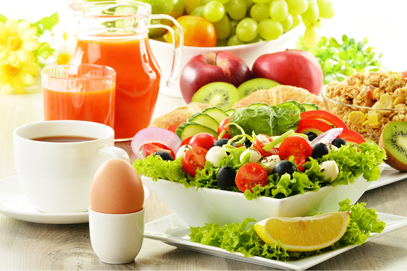
- Eggs increase your risk for heart problems: The common belief is that egg yolk is the culprit. It’s true that egg yolks contain high levels of cholesterol, but this is dietary cholesterol and not the blood level cholesterol that’s associated with an increased risk of heart attacks. In fact, egg yolk offers many benefits. It contains carotenoids which are good for the eyes, and is rich in B-vitamin complex choline, which reduces inflammation and promotes neurological function. So experts say it’s safe to go ahead and have an egg a day.
- Carbohydrates and fat should never be combined: Eating foods with both these nutrients at the same time will not increase your risk of fat gain as long as your calorie intake is within the healthy limit. The truth is that a balanced diet that combines healthy fats, complex carbs is nutritious and filling, and will help maintain your energy levels.
- Honey is natural and a healthy alternative to sugar: Honey does contain more nutrients than sugar but it is high in fructose or natural sugar. Excessive intake of sugar in any form is dangerous to health and will increase the risk of conditions such as obesity, heart disease, and liver disease.
- Eating more frequently can boost your metabolism: Calorie tracking is the key whether you eat two or three meals or multiple small meals. At the end of the day, you should burn more calories than you consume.
- Sticking to low fat food helps weight loss: Studies have found that a low fat diet will not help weight loss. A diet that is high in fat but low in carbs leads to more weight loss than a low-fat diet. When it comes to nutrition, the type of fat and carbs you eat is also more important than the amount.
- Avoid drinking coffee: Coffee is considered unhealthy as it contains caffeine. However, coffee contains more antioxidants than fruits and vegetables, and comes with powerful health benefits. How much coffee is safe? The general recommendation is four or five cups of coffee a day (with around 400mg of caffeine).
- Detox promotes weight loss: Detox diets are supposed to cleanse the body. Some allow only fluids and others, only fruits and vegetables. However, detox is dangerous as it can backfire. It can leave you feeling weak and even cause your metabolism to crash. You would also be at risk of losing muscle mass. The best way to detox is to do it on a regular basis and in a healthy way rather than go on a drastic detox diet. Understand which foods are good for you and which foods affect you negatively. Avoiding those with a negative impact will minimize your exposure to toxins.